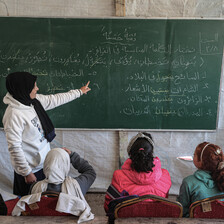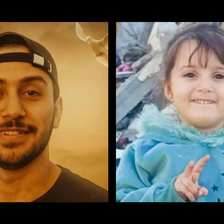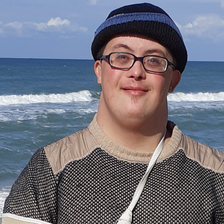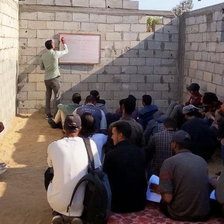The Electronic Intifada 20 June 2025

Destruction in the area surrounding Ohood Nassar’s home
I woke up at 7 am on 14 May and started getting ready for a day’s work.
My plan was that I would go to an education tent in Jabaliya refugee camp, northern Gaza. I had been teaching there since February.
The tent served as a school for 120 boys and girls.
Before setting out, I asked my mother what she would be preparing for lunch. In her warm and tender voice, she replied. “I’ll make you dawali [stuffed grape leaves].”
“Thank you, Mom,” I said, hugging her tightly. “That’s my favorite meal.”
Finding the ingredients for such a dish has become nearly impossible in Gaza, where food is scarce and prices exorbitant.
There are eight people in my family. It costs more than $60 to make dawali for us all.
When I reached the education tent, I could feel a strong sense of enthusiasm from my students as they said, “Good morning, Teacher!”
I told them that I was organizing a story contest.
The children would be encouraged to write personal narratives about their experiences during the war. Prizes would be given to the best writers.
At 11 am, a supervisor from Gaza’s education ministry visited me. I told him about my wish to expand the education tent, so that we could teach fifth and sixth grade students.
The supervisor strongly backed the idea.
So I put up a notice at the entrance of the tent, saying that new students were welcome.
By 1 pm, I was back home, where I began watching recordings of university lectures.
I need to watch recorded lectures as I have been deprived of physically attending my university classes since Israel declared its genocidal war on Gaza in October 2023.
I took notes while watching the lectures and tried to pay attention.
Yet my mind was scattered. The trauma we are going through makes concentrating very difficult.
Chaos
At 4 pm, my train of thought was interrupted by my older brother, Uday. Panicking, he told me to leave our home immediately, taking only my bag of essential documents.
Suddenly, we heard shouting. There was a general sense of chaos.
I saw people running over debris, screaming.
I asked one man what was happening. He told me that the Israeli forces had warned that a house less than 20 meters from ours was going to be bombed within the next few minutes.
I met my mother and sisters at a nearby encampment. “Hurry,” my mother said.
We held hands and ran to my sister’s house, which is about 80 meters away.
I dropped my bag on the ground and broke into tears. I felt as if the anxiety would kill me.
I called my father, who was at work, to warn him not to return home. I told him we were safe at my sister’s house.
An hour later, my father arrived. He told us we would spend the night at my sister’s and try to rent a place in western Gaza the next day.
As we discussed what to pack and how to prepare for displacement, we heard neighbors shouting that the house next door had received a warning. Once again, we had to evacuate rapidly.
We ran outside, heading toward my aunt’s home in Beit Lahiya. It is located about 600 meters from where my sister lives.
After walking for 150 meters or so, we were overwhelmed by fear. The skies were filled with drones and other warplanes.
So we turned around and went to Al-Awda Hospital. Once we got to the hospital, we sat on the ground outside.
By now, it was 10 pm. We hadn’t eaten anything since breakfast.
Taking an enormous risk, my brother Uday went back to our home to fetch some food. He then came to the hospital holding a pot of dawali.
Once I saw him, it felt like my heart had started beating again. Uday had borrowed a chair from a neighbor so that he could serve the meal.
Fleeing again
Just as we started eating, a nearby house was bombed. Shrapnel flew past us.
We had to flee again – this time to my aunt’s home in Beit Lahiya.
My aunt burst into tears when she saw us. We could see the fear etched on her face.
She had heard from a displaced relative that our area had been under heavy attack.
“I tried calling you many times,” my aunt said. “But the signal kept falling.”
That night, I fell into a deep sleep as soon as my head hit the pillow. The next morning, I awoke to the sound of my mother’s gentle voice.
We were to return to my sister’s house, my mother told me.
At 8 am, we arrived there and had a simple breakfast of fava beans, thyme and a little bread. We decided to go back to our home to retrieve some essentials – clothing, food and bedding material.
Meanwhile, my father searched for somewhere we could stay in western Gaza.
My phone rang as soon as we were back at our house.
When I saw it was a “private number,” my heart sank. I knew that it had to be the Israeli military.
I answered hesitantly. The man on the other line was a Hebrew speaker; my fear was confirmed.
I couldn’t bear the situation, so I handed the phone to my mother. The caller asked to speak with a man, so I then gave the phone to my brother.
The Israeli soldier calling us said that our home would be bombed within 10 minutes. If we didn’t leave immediately we would be buried under the rubble, he warned.
We ran outside, informing neighbors of the warning.
The Israeli army phoned once more as we hurried toward my sisters’ home. I handed the phone to a neighbor and begged him to speak with the soldier.
Then I rushed back to my house so I could be sure that my mother and brother had evacuated.
“The army called again,” I told my mother. “Where are my little sisters?”
In my panic, I had forgotten that they had already gone to our elder sister’s home. My mother put her hand on my shoulder and reminded me that they were safe.
We tried to find transportation, but there was none. My feet were aching and my heart was racing.
I scanned the area to see if I could find a journalist. Someone who could document what we were going through.
It feels like Israel is trying to prevent the world from knowing about our plight.
So many journalists in northern Gaza have been assassinated. Brave reporters like Ismail al-Ghoul and Hossam Shabat.
An Israeli soldier phoned again. My brother took the call.
The soldier ordered him to return to our house to ensure it was empty and then walk 300 meters away to witness its destruction. When the missile hit, shrapnel flew dangerously close to my brother.
We were still at my sister’s house, when the missile hit our own home.
We could hear the explosion. We could see black smoke rising.
We were devastated. The knowledge that the army had instructed my brother to watch from a close distance made a horrible experience even worse.
Less than an hour later, the Israelis issued a warning that it was targeting the house next to my sister’s. We had to flee again.
We had nowhere to go.
We managed to find a vehicle that took us to western Gaza. Arriving in that area, we had to wait in the streets until my father found us a temporary shelter.
Two days after we had moved to western Gaza, a neighbor told me that the education tent where I worked had been burned to the ground as Israel had again bombed the area.
The education tent had been my sanctuary. I had devoted a huge amount of time and energy to it.
Now it has been reduced to ashes.
Ohood Nassar is a writer currently finishing her degree in education studies in Gaza.





